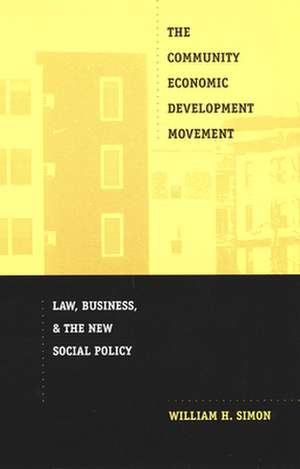The Community Economic Development Movement – Law, Business, and the New Social Policy
Autor William H. Simonen Limba Engleză Paperback – 9 ian 2002
In this book William H. Simon provides the first comprehensive examination of the evolution of CED, complete with an analysis of its operating premises and strategies. He describes the profusion of new institutional forms that have arisen from the movement, amalgamations that cut across conventional distinctions-such as those between private and public-and that encompass the efforts of non-profits, co-operatives, churches, business corporations, and public agencies. Combining local political mobilisation with entrepreneurial initiative and electoral accountability with market competition, this phenomenon has catalysed new forms of property rights designed to motivate investment and civic participation while curbing the dangers of speculation and middle-class flight.
Illustrated with examples from many localities and including an appraisal of the strengths and weaknesses of the prevailing view of CED, this book will prove to be a valuable resource for local housing, job, and business development officials, community activists, and students of law, business, and social policy.
Preț: 239.76 lei
Nou
Puncte Express: 360
Preț estimativ în valută:
45.88€ • 47.73$ • 37.88£
45.88€ • 47.73$ • 37.88£
Carte tipărită la comandă
Livrare economică 14-28 aprilie
Preluare comenzi: 021 569.72.76
Specificații
ISBN-13: 9780822328155
ISBN-10: 0822328151
Pagini: 240
Ilustrații: 2 tables, 3 figures
Dimensiuni: 156 x 234 x 19 mm
Greutate: 0.37 kg
Editura: MD – Duke University Press
ISBN-10: 0822328151
Pagini: 240
Ilustrații: 2 tables, 3 figures
Dimensiuni: 156 x 234 x 19 mm
Greutate: 0.37 kg
Editura: MD – Duke University Press
Cuprins
Contents:
Introduction
Background: The turn to community-based organizations in social policy
Three logics of community action
The community as beneficiary of economic development
The community as agent of economic development
Constrained property: Rights as anchors
Induced mobility
Institutional hybridization
The limits of CED
Introduction
Background: The turn to community-based organizations in social policy
Three logics of community action
The community as beneficiary of economic development
The community as agent of economic development
Constrained property: Rights as anchors
Induced mobility
Institutional hybridization
The limits of CED
Notă biografică
Textul de pe ultima copertă
"A good overview of the intellectual roots and current policy context for the growing movement to rebuild this country's communities."--Martin Eakes, C.E.O., Self Help Credit Union
Descriere
A study of the evolution of the Community Economic Development movement, paying particular attention to the institutional and legal mechanisms it utilises.



















